A CENTURY OF STYLE – HALLS KANSAS CITY
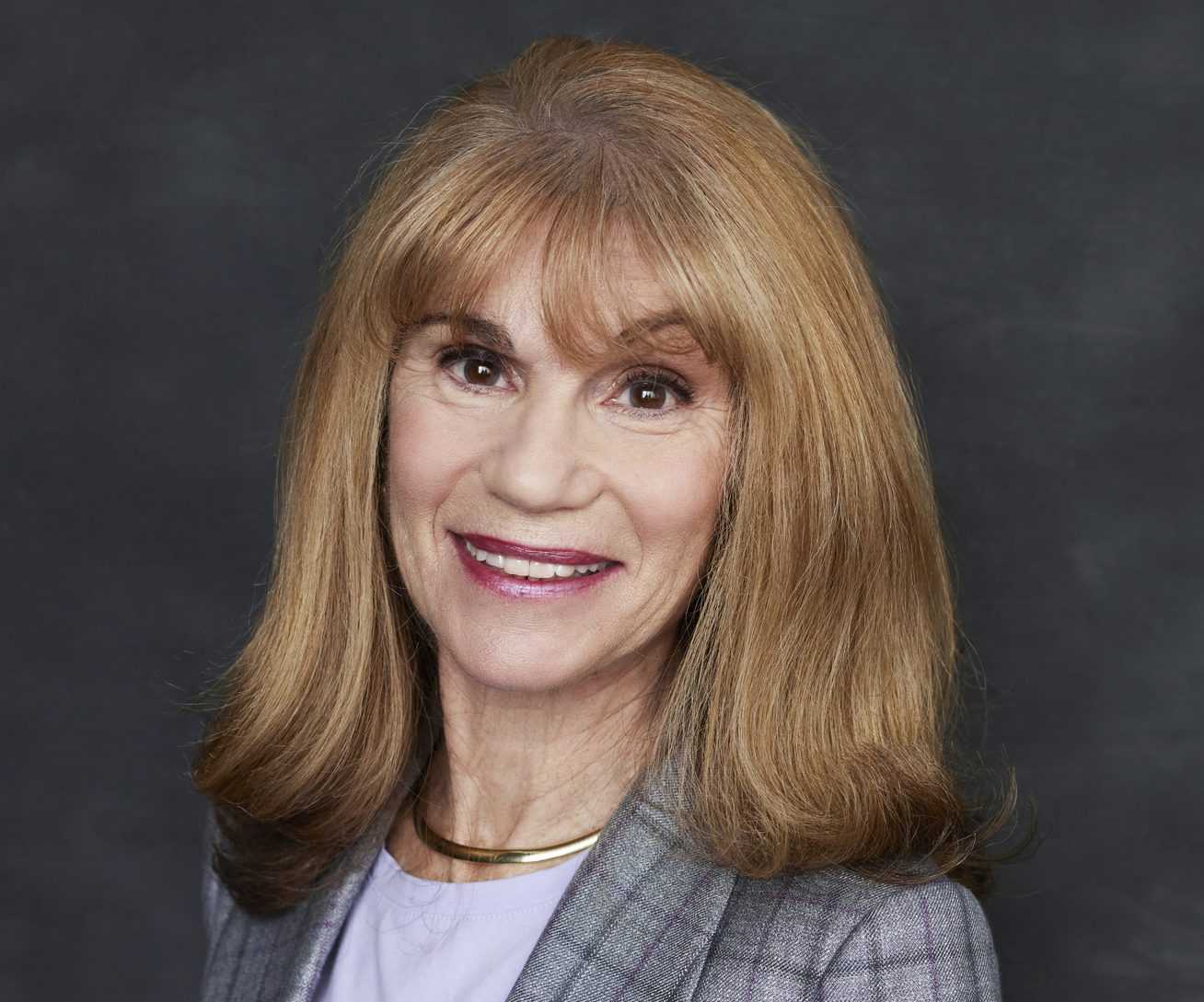
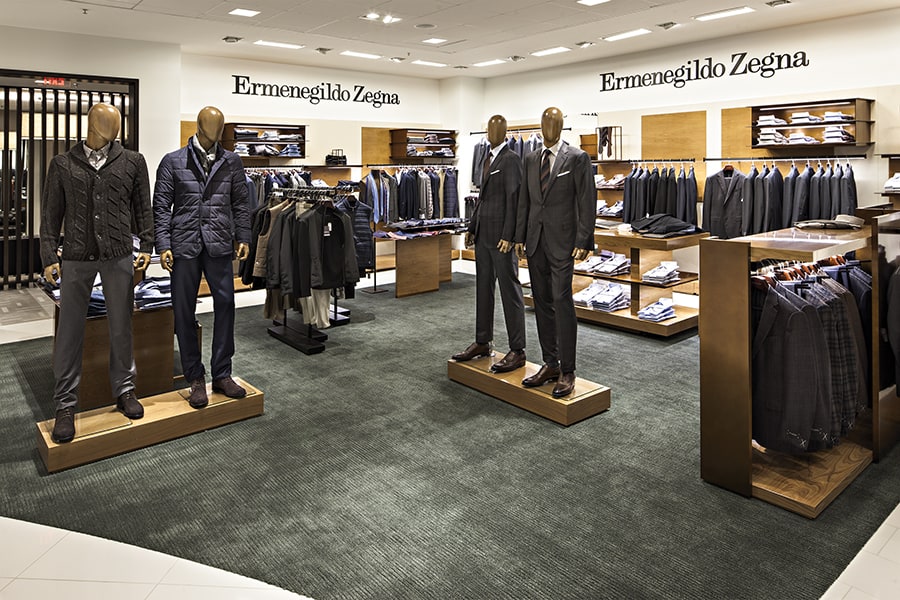
But for Cole, who spent 20 earlier years at Neiman Marcus, the real strength of the store is its people. In menswear, its top merchants Todd Epperly and Al Leinen have turned this Kansas City specialty department store into something truly exceptional. Here, we chat with all three menswear execs to discover their success secrets.
How has Halls managed to stay in business for 100 years?
Cole: Halls has always been committed to staying relevant to the times and to our customers. Throughout the years, we’ve been in several locations, added and dropped merchandise categories, and weathered challenges to stay true to Joyce C. Hall’s mission: “To be first with the best in Kansas City.” We pride ourselves on our commitment to personalized, friendly service and our continuing search for unique merchandise.
What do you see as Halls’ key challenges and opportunities?
Creating reasons for our core customers to visit us in our new location is both a challenge and an opportunity.
How will you make up the volume of recently going from two stores to one?
Going from two stores to one allows us to run a healthier more profitable business.
How do you rate yourself in terms of customer service?
We’ve always offered a personal level of service and received high marks for it. Our store now showcases amenities that reflect this, such as HBAR (where we serve a casual lunch menu of sandwiches, soups and salads, local coffee and cocktails), a professional alterations department, text and email communications, mobile POS, valet parking during the holidays, free shipping of our beauty products, large luxurious fitting areas, wedding registry offerings and compelling special events. We mentor our newest Style Experts on how to build a clientele and communicate with them to meet their shopping needs.
How much business do you think you’re losing to competition online and how do you capture that?
Like all brick and mortar stores, we’ve lost some business to online. But we are encouraged with high sell-throughs on unique merchandise, locally made items and exclusive products that are not readily available online or broadly distributed elsewhere.
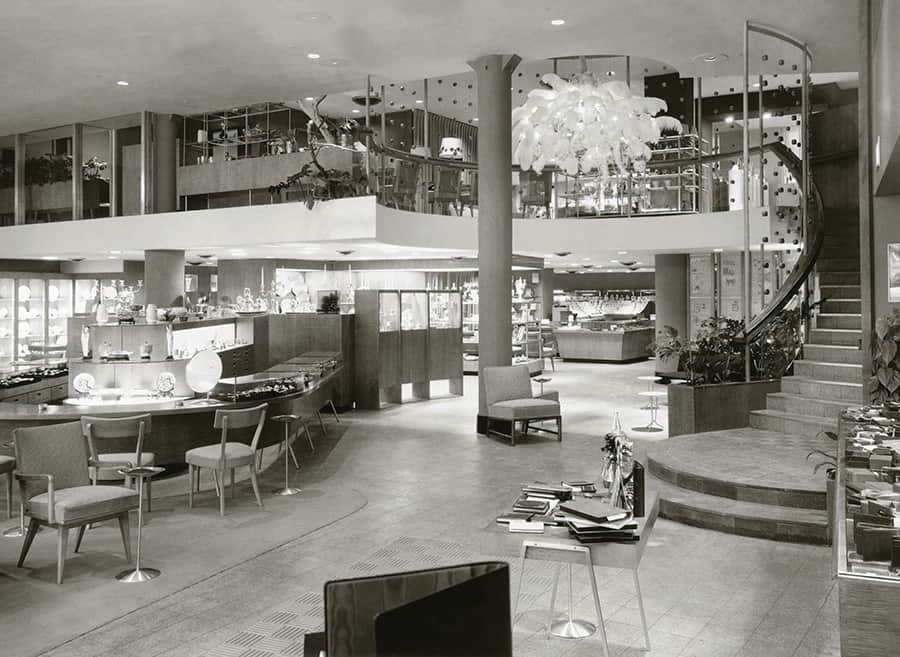
What are you most proud of?
I’m most proud of our fantastic team, community involvement, loyal customers, unique product offerings and beautiful new store, which architecturally blends modern design with historic elements from our former flagship.
What keeps you awake at night?
Running a healthy business while staying current and compelling to customers.
Analysts say the conventional store model (wholesaler to retailer to consumer) is no longer working: do you agree?
No, but I believe it works differently now. Consumers can often find a product cheaper somewhere if that’s their goal, which can make it difficult to create loyalty with new customers. We need to go to them, not wait for them to come to us. Our new location is in the heart of the resurgence in Kansas City’s urban core where hundreds of high rise residences have just been built and many more are under construction for the next few years. Many of these residents are younger than our core customer, so we plan to deliver the Halls experience and high-touch service to them through partnerships with the buildings where they live. Also we will launch Halls Style Club in 2017, through which we will reach out to past customers and offer them an exclusive service that won’t depend on them coming to us, but rather will deliver Halls to their door.
How will you compete in this era of off-price stores and vendors selling direct to consumers?
Trying to compete with off-price stores is a slippery slope, especially if your core customer is not looking for that from you. We compete with our vendors who sell online by always matching their prices. Vendors who are now selling direct are seeing that customers are buying at time of need rather than early in the season. Yet, they’re taking markdowns at prime shopping times rather than offering fresh merchandise when customers really want it: when the weather changes, at holiday time. As an industry, we should be working together to change this cycle.
What is your philosophy of sales/promotions?
Promotions are a positive boost to business when they offer a good deal when the customer wants to buy and margins are not compromised. We offer in-season promotions, which work well. We have not increased the frequency of our sales but today, our introductory offers must provide a larger discount to create a call to action from the customer.
How do you maintain margins in today’s highly promotional era?
Vendors can learn from the men’s market which offers high quality merchandise that we can promote at a good value while still maintaining our margins. We include these during all store promotions.
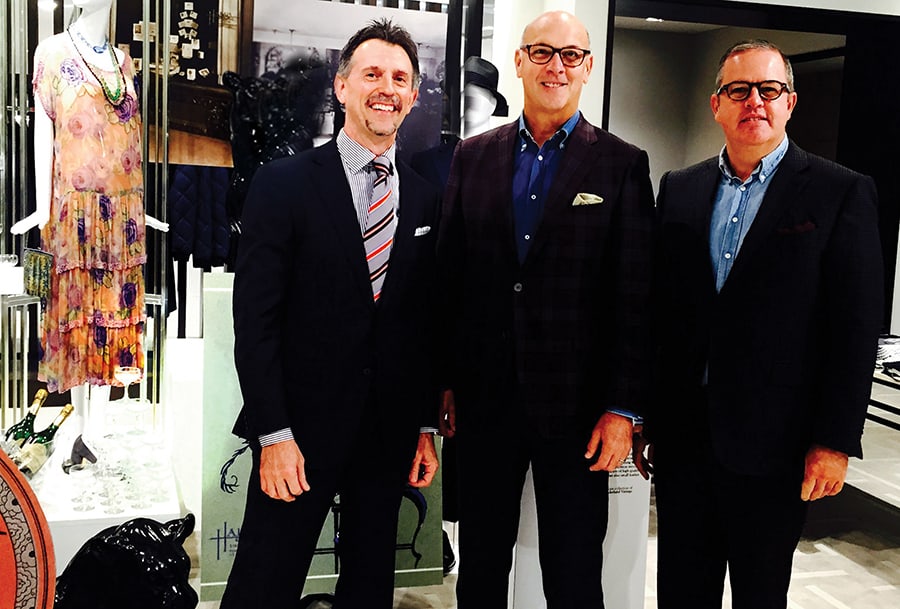
What are the advantages of not being a public company?
We are more nimble and able to make quicker decisions, as a committee is not needed. Along with making financial goals, there is an expectation of community support and involvement, which proves to be very rewarding.
Who is your direct competition in Kansas City?
We have our share of the national big box suburban stores and smaller independent stores, but our competition is mostly retailers in larger cities to which so many people travel for business or pleasure: Chicago, Los Angeles, Dallas, New York. After all, buying something when you travel is part of the adventure. This works in our favor as well, since we are a large city in the Midwest. Many business people travel here, as well as tourists who come for shopping weekends, to participate in the active arts and culture scene, and to enjoy various holidays throughout the year. And you can’t forget the pro football and baseball teams and their fans who travel to watch them. Go Chiefs! Go Royals!
Any chance of opening an outlet store?
I never say “never.”
How are you planning to capture a younger customer? You’ve got great product, now how do you get them in?
Epperly: Halls has begun to focus more heavily on social media this year to reach a younger demographic. We are seeing success on Facebook and Instagram, and we plan to dedicate a significant portion of our 2017 advertising budget to social media. However, we are not looking for just “likes” on Facebook. Our goal is to bring traffic into the store, so we continue to enhance our instore environment. I believe our new Bridge space is one of the best-designed contemporary departments in the country. We have separate music and video monitors, along with a more social setting to appeal to a younger customer. We regularly test new brands, giving us much credibility in the marketplace.
I believe a customer can come to Halls and know he/she will see something that can’t be found anywhere else in the Kansas City area. Supporting local brands is key to drawing in the younger Kansas City customer, and there are key brands we have exclusive in our area. Many of these brands have developed exclusive t-shirts for Halls. For example, we’ve sold 6,100 t-shirts from one local brand.
How many brands do you carry in menswear? Do you believe in narrow and deep assortments or broad and shallow?
We are narrowing our vendor matrix in almost every area of men’s. Too many brands in the store can confuse customers. Also, we don’t need brands that are overly distributed in our market, or brands that run sales on their e-commerce site almost every other week. I believe this is destroying their brand credibility along with our margins. But while we’re narrowing our vendor matrix, we are always looking for new brands to be at the forefront of fashion and meet the evolving needs of our customers.
What are your best-selling sportswear items/brands this season?
We’re doing well with Eleventy, Hugo Boss, Good Man Brand, Todd Snyder, Moncler, AG Denim, Patagonia, Theory and Peter Millar. Polo Ralph Lauren is also performing well for us this season. Key pricepoints in sportswear are under $300 for wovens and sweaters, under $200 for denim, under $600 for outerwear. Price points of lines like Theory, Hugo Boss, Eleventy, Good Man Brand, Todd Snyder are what we call “better” pricepoints. These continue to be more important to our mix. Best-selling brands for accessories/belts include Gucci, Tumi and Ferragamo.
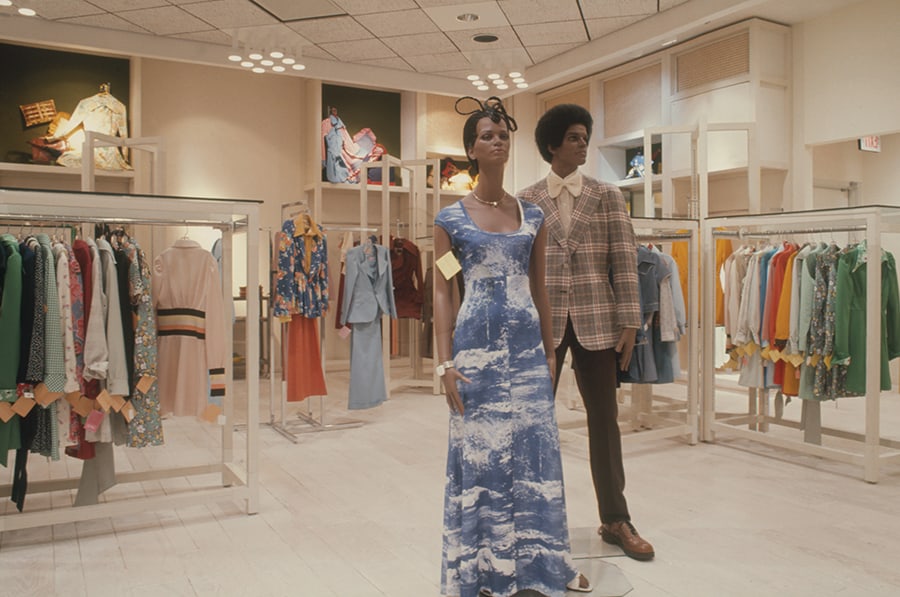
Exclusivity or at least more controlled distribution. And cohesive collections: lines that feature both clothing and sportswear need the components to more closely coordinate. Also, high-end designer lines can no longer rely on their name alone. They need to stay on top of market trends with consistently strong collections. Sameness, season after season, is not working for many high-end lines: there are too many more affordable brands knocking them off, and doing a good job of it. Lower end lines are using better fabrics and the customer is noticing. What’s also needed: higher initial markups. Keystone is no longer enough.
How has tailored clothing business changed in recent seasons?
Leinen: In the past two years, in the new store, we have seen a shift in sales from suits to sport coats, with sportcoats gaining momentum and almost catching suit sales this year. Our major focus on the made-to-measure business in the new store has gained the most momentum in the mix, generating almost a quarter of our tailored business. The pant business is steady with most of the growth in five-pocket wool pants, which is under the sportswear division. Formal is steady during the holidays and does good business for weddings and special events. We’re doing more suits and tuxedos for weddings with our opening pricepoint at $300. With large wedding parties, we can sell 10 to 15 units at a time, which turns into a nice sale.
Who is your competition in tailored clothing and how are you competing?
Our competition is anyone who is doing tailored clothing business in a store, over the internet or someone going to the place of work to sell tailored clothing. I feel we can compete by going to market and finding the best brands with the best models and looks for the best value in our store. A professional sales staff is a key factor in our success and we consider our staff experts in fitting clothing. We want our customers to look and feel their best and be proud to say it came from our store. I also put myself on the selling floor anytime it’s possible, make house calls and visit the customer’s workplace to accommodate his schedule.
What’s the most exciting thing happening in the men’s clothing business these days?
The soft jacket has been a big success. With the workforce being more casual these days, the dressy sportcoat has been put at the back of the closet. The less constructed jacket fills a void with the more casual dress code and still can be dressed up with dress pants to give a polished look. This category is helping sportcoats drive the business. Zegna, Canali, L.B.M. 1911, Todd Snyder and Ibiza are a few of the brands selling well.
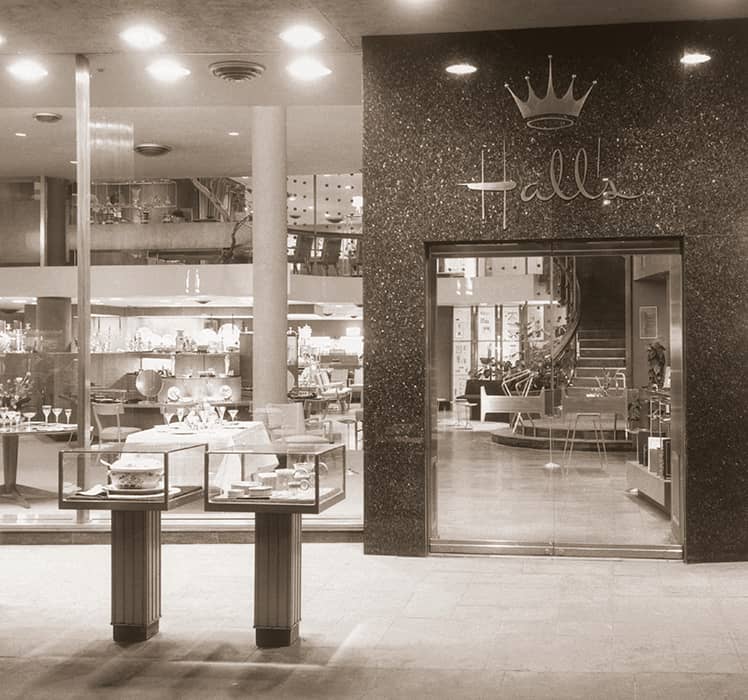
The dressy blue blazer has been a disappointment the past couple of years, but we’re seeing some gains with models and fabrics that give guys a reason to buy a new blazer. With the casual dress code in many workplaces, the blazer, when made like a soft jacket with many pockets in great travel fabrics, has piqued new customer interest. Talk a bit more about your made-to-measure business. It’s the fastest growing part of the business and will only improve with technology and training. It’s become almost a quarter of our tailored clothing volume and will go higher if we continue to give the customers the great fit they’re requesting. By discovering customers’ needs, we’re now able to get them a made-to-measure suit that arrives within a couple of weeks. And once they’re happy with the custom details and perfect fit, they keep coming back.
What do you need from the market that you’re not getting?
Newness. It’s tough to change the look of a suit, sportcoat or pants, but I think the industry could find and develop new and better fabrics and take chances by bringing new ideas to the table.
How price conscious is your consumer? How much business is good vs better vs best?
The consumer always wants to feel like he’s getting value, whether it’s at top of the line or an opening pricepoint. We’re still doing about 75 percent of our clothing sales at the top, with Zegna as our anchor brand. Of course, we sell the most units with our opening price tailored clothing, the majority of which is between $495 and $795. Once you get above $1,000 for the average shopper, the air gets thinner and it has to be something very special.
To what extent are young guys buying suits?
The majority of the opening pricepoint tailored clothing is sold to younger customers. These young guys want the jacket to be fitted and the pant to be slim and narrow at the bottom. When a young customer is shopping for a tailored suit, we introduce him to the best quality suit in his size. Then we work with the customer to find the right fit, pricepoint and style, which for younger men tends to be in lines such as Todd Snyder, Calvin Klein, Hugo Boss, John Varvatos and Paul Betenly.
How do you get guys to buy more tailored clothing more often?
Halls provides personalized service to each and every customer. By offering him this tailored experience, he is more likely to feel well put together from top to bottom. This positive experience often results in compliments, confidence, an appreciation for tailored clothing and a desire to return to Halls for future purchases.








